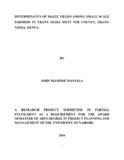| dc.contributor.author | Wanjala, J. M | |
| dc.date.accessioned | 2017-01-06T10:02:58Z | |
| dc.date.available | 2017-01-06T10:02:58Z | |
| dc.date.issued | 2016 | |
| dc.identifier.uri | http://hdl.handle.net/11295/99631 | |
| dc.description.abstract | Maize is a global crop. In terms of nutrient formation, maize contains approximately
72% starch, 10% protein, 4% fat supplying 365kcal/100g.It is a staple food in many
African countries including Kenya with the largest production from small scale farmers.
Investigating to understand the determinants of maize yields among small scale farmers
is therefore an important area of study. The purpose of the study was to investigate the
determinants of maize yields among small scale farmers in Trans Nzoia West Sub
County of Trans Nzoia County in Kenya.. The following objective guided the study; to
investigate how access to farm inputs determine maize yields in Trans Nzoia West Sub
County; to assess how adoption of modern farming techniques by small scale maize
farmers determine maize yields in Trans Nzoia West Sub County; to investigate how
incentives to small scale maize farmers determine maize yields Trans Nzoia West Sub
County; to assess how weather conditions determine maize yields in Trans Nzoia West
Sub County. The study adopted descriptive survey design. The target population was
38,183 representing the total number of households that practice small scale crop
farming in Trans Nzoia West Sub County. A Sample size of 396 respondents from small
scale maize farmers in Trans Nzoia West was used for the study. Cluster sampling of
villages in the wards was done then random sampling done on the clusters to get
respondents. Questionnaires and interview schedule was used to collect data. A pilot
study was done in the neighboring Chebon location. To ascertain the reliability of the
instruments, test-retest method was used. The collected data was then analyzed using
frequency tables and percentages and explanations given in each case to guide
interpretation. Results of the analysis were interpreted and recommendations made at
the end of the study. It was found that 40% and 58% of farmers do not use certified
seeds and organic fertilizers respectively largely due to cost, distance and unavailability
of the inputs close to their farms. In addition, a large percentage of small scale maize
farmers do not test acidity levels or manage nutrient levels of their farms. The inputs
subsidy program, difficulties to access credit and unavailability of inputs in farmers’
locations was experienced by a large percentage of small scale maize farmers.46% and
31% respectively of small scale maize farmers’ maize yields had been affected by
xiv
unreliable rainfall and high temperatures. Recommendations made included; County
Government of Trans Nzoia Should, establish inputs distribution centers in sub
locations. Streamline inputs subsidy programs and Extension officers to educate
farmers on soil acidity and nutrient management. The study suggested further study on
how maize yields is affected by small scale maize farmers’ attitude towards modern
farming techniques and the influence low market prices for maize and importation of
maize which retail at cheap prices | en_US |
| dc.language.iso | en | en_US |
| dc.publisher | University of Nairobi | en_US |
| dc.rights | Attribution-NonCommercial-NoDerivs 3.0 United States | * |
| dc.rights.uri | http://creativecommons.org/licenses/by-nc-nd/3.0/us/ | * |
| dc.subject | Determinants Of Maize Yields Among Small Scale Farmers In Trans Nzoia West Sub County, Transnzoia, Kenya. | en_US |
| dc.title | Determinants Of Maize Yields Among Small Scale Farmers In Trans Nzoia West Sub County, Transnzoia, Kenya. | en_US |
| dc.type | Thesis | en_US |



